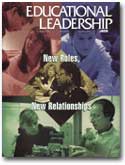How do we encourage teachers to venture into the new paradigm of teacher as researcher? What must administrators and school districts do to support this shift in teachers' roles? As the director of a Master of Arts in Education program in southeastern Ohio, I became interested in these questions.
Our program requires our students, who are all practicing teachers, to complete two research courses and an action research project as part of their degree. Action research is a classroom-based study initiated and conducted by teachers that allows them to explore issues of interest to them. It also provides a formal way to make teachers' knowledge part of the literature on teaching, bringing them inside the power structure of education (Cochran-Smith and Lytle 1990).
I noted that teachers went into the research component of the program feeling anxious and hostile but emerged feeling positive about the experience and their newly formed identities as teacher-researchers. What was this transformational process, and how did teachers perceive it? More important, what were school districts doing to encourage teachers to continue their role as researchers?
How Research Changed Teachers
To answer these questions, I surveyed 90 graduate students from 14 different school districts in varying stages of completing their research requirements. Findings confirmed that teachers' attitudes toward research changed as a result of knowing, understanding, and using research methods.
Traditionally, teachers have been classroom practitioners deeply involved in the everyday realities of their work. In this role, argues Rudduck (1989), teachers are subject to the deadening effects of routine. After time, teaching practices can become static, and the classroom tends to be continually reconstructed in its own image. One attempt to address this issue is to redefine teachers' professional responsibilities to include the role of researcher.
Teachers without previous research experience often found the idea of teachers as researchers inconsistent with the values, methods, and perspectives they perceived as relevant. They saw little value in educational research and made no connection between research and effective classroom practice. They perceived research as working with computers, learning “how to do” statistics, using technical language, and wasting time on a study that would probably sit on a shelf.
As teachers gained experience and success with research, their attitude toward research generally improved. Teachers in the process of applying research methods had more variance of attitudes than either novice or experienced teacher-researchers.
Experienced teacher-researchers stated that their research brought them many personal and professional benefits, including increased collegiality, a sense of empowerment, and increased self-esteem. Teacher-researchers viewed themselves as being more open to change, more reflective, and better informed than they had been when they began their research. They now saw themselves as experts in their field who were better problem solvers and more effective teachers with fresher attitudes toward education. They also saw strong connections between theory and practice. One teacher summarized the benefits gained from completing a research project: I have gained a new respect for research in education. I am more aware of current trends and the need for reform. I now identify problems with more confidence and apply more logical analysis to problems. I now read research-related literature when attempting to solve a problem. I am more objective and confident. I talk less and observe more. My salary has increased, and I have been asked to do several workshops.
Supporting Teachers as Researchers
It's evident that teachers can become researchers, but does the teacher as researcher become a permanent role? Most teachers surveyed said no, due to lack of administrative and school district support. Ninety percent of those questioned said their districts or administrators showed little evidence that they valued teachers' involvement in or knowledge of educational research. Rather, teachers complained that educational journals were not available to them in their schools and that most school board members, administrators, and colleagues did not read or discuss research. Districts gave no recognition for teacher involvement in research activity and rarely sent teachers to research conferences. Because of budget cuts, school districts allowed teachers to attend professional development workshops only if they themselves paid for a substitute teacher.
- Administrators demonstrated a strong interest in educational research and expected teachers to be familiar with recent literature.
- Administrators openly encouraged teachers to test and implement new research findings in the classroom.
- District newsletters provided teachers with updates on educational research.
- School libraries provided teacher resource centers, which included research journals and educational books.
- The district encouraged teachers to attend conferences and seminars and paid their fees.
- Teachers were encouraged to participate in a degree program that provided formal research training.
- Teachers had on-going opportunities to reflect upon classroom practices and share new information.
Within a supportive context, teacher-researchers have the potential to enhance the professional image of educators. The notion of teachers as researchers is based on the assumption that school change is most effectively promoted from within the classroom; teachers who have systematically reflected on teaching practices become agents of change. Research empowers teachers to become leaders, strengthens collegial bonds, and builds teacher networks. Further- more, studies have shown that involvement in research increases teachers' role in school- wide decision making (Maeroff 1988, Sardo-Brown 1992). But simply training teacher-researchers is not enough.
Teachers, administrators, and university personnel must work together to identify and support the needs of teachers in their roles as researchers, or the process of changing our educational system will remain fragmented. Success for educational reform depends not only on teacher training but on administrative support that encourages teachers' growth. If we are going to create an engine of change, we must also provide the fuel and maintenance to keep it running.
